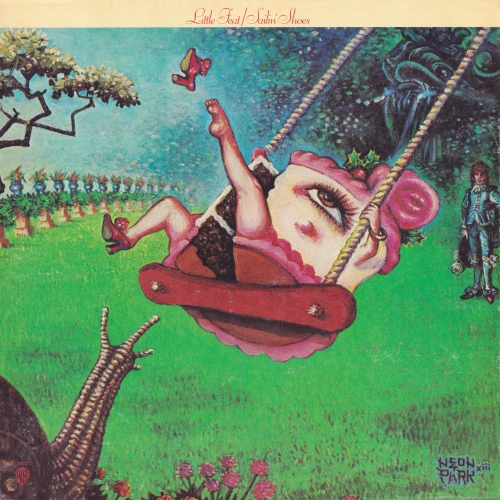

Sailin' Shoes
Studio album by Little Feat
Released 1972
Recorded Late 1971
Genre Rock
Length 37:27
Label Warner Bros.
Producer Ted Templeman
Sailin' Shoes was the second studio album by the American rock band Little Feat, released in 1972. It is notable for several reasons.
First, it introduced the work of Neon Park to the group, with his design of a sailing shoe of a cake swinging on a tree swing that adorned the front cover, which seems to be an allusion to The Swing by painter Jean-Honoré Fragonard. Second, it was a more refined album than predecessor, signaling a shift from that album into the next. Third, it marked the last album original bassist Roy Estrada appeared on.
Highlighted by a reworked group version of "Willin'," the track that had led Frank Zappa to sack guitarist and vocalist Lowell George from The Mothers of Invention, it also featured such enduring tracks as "A Apolitical Blues," "Easy to Slip" and the title track, all by guitarist and lead vocalist Lowell George, the second co-written with Martin Kibbee (a.k.a. Fred Martin), a former bandmate (The Factory), and the first appearance of the "George/Martin" credit on a Little Feat record.
It was the last full Little Feat record to be produced by an outsider until 1977's Time Loves a Hero, the three albums in the interim produced nearly in their entireties by Lowell George.
Professional reviews:
allmusic 5/5 stars
Review by Stephen Thomas Erlewine of allmusic:
Little Feat's debut may have been a great album but it sold so poorly, they had to either broaden their audience or, in all likelihood, they'd be dropped from Warner. So, Sailin' Shoes is a consciously different record from its predecessor - less raw and bluesy, blessed with a varied production and catchier songs. That still doesn't make it a pop record, since Little Feat, particularly in its first incarnation, was simply too idiosyncratic, earthy and strange for that. It is, however, an utterly thrilling, individual blend of pop, rock, blues and country, due in no small part to a stellar set of songs from Lowell George. If anything, his quirks are all the more apparent here than they were on the debut, since Ted Templeman's production lends each song its own character, plus his pen was getting sharper. George truly finds his voice on this record, with each of his contributions sparkling with off-kilter humor, friendly surreal imagery and humanity, and he demonstrates he can authoritatively write anything from full-throttle rock & roll ("Teenage Nervous Breakdown"), sweet ballads ("Trouble," a sublimely reworked "Willin'"), skewered folk ("Sailin' Shoes"), paranoid rock ("Cold, Cold, Cold") and blues ("A Apolitical Blues") and, yes, even hooky mainstream rock ("Easy to Slip," which should have been the hit the band intended it to be). That's not to discount the contributions of the other members, particularly Bill Payne and Richie Hayward's "Tripe Face Boogie," which is justifiably one of the band's standards, but the thing that truly stuns on Sailin' Shoes is George's songwriting and how the band brings it to a full, colorful life. Nobody could master the twists and turns within George's songs better than Little Feat, and both the songwriter and his band are in prime form here.
My Review:
I remember vividly the day 40 years ago that I was working at the record shop and we opened the boxes of new releases. There was this funny-looking cover by a band I had never heard of… Little Feat. We thought "What the heck" and opened it, put it on the turntable, cranked the volume and out of the speakers comes those glorious opening notes of "Easy to Slip". Then comes the ominous sounding "Cold, Cold, Cold" with that great Lowell George slide guitar and harmonica. The next song "Trouble" is a tremendous light song that sets us up perfectly for the full-tilt "Tripe Face Boogie" which has us dancing up and down the aisles of the store with that great screaming slide guitar. Then comes a new version of "Willin'" with that beautiful steel guitar work by Sneaky Pete, the great piano work of Bill Payne and the great harmonies. Next is "A Apolitical Blues", a blues number with Lowell's tremendous acoustic slide guitar and another tasty bit of piano from Bill. Side 2 starts with the title track, another nice acoustic blues tune. This leads us into the breakneck-paced "Teenage Nervous Breakdown", another tune that demands getting up and dancing. "Got No Shadow" is a preview of the sound of later Little Feat albums. Then "Cat Fever" showcases Bill's piano and Lowell's guitar. And finally, "Texas Rose Cafe" shows some of the jamming style of later Little Feat.
In my best John Cusack voice, this is an "all-time Top Five" (referencing the movie High Fidelity, in case you don't know it).
LP track listing
All songs written by Lowell George except as noted.
Side One
1. "Easy to Slip" (Lowell George, Fred Martin) – 3:19
2. "Cold, Cold, Cold" – 3:58
3. "Trouble" – 2:15
4. "Tripe Face Boogie" (Richie Hayward, Bill Payne) – 3:14
5. "Willin'" – 2:54
6. "A Apolitical Blues" – 3:25
Side Two
7. "Sailin' Shoes" – 2:49
8. "Teenage Nervous Breakdown" – 2:10
9. "Got No Shadow" (Bill Payne) – 5:05
10. "Cat Fever" (Bill Payne) – 4:35
11. "Texas Rose Cafe" – 3:43
Personnel
* Lowell George - vocals, guitar, harmonica, baritone saxophone, drum machine
* Richie Hayward - drums, percussion, backing vocals
* Bill Payne - piano, organ, accordion, backing vocals, lead vocals on "Cat Fever"
* Roy Estrada - bass, backing vocals
Additional personnel
* Milt Holland - percussion on "Easy to Slip" and "Trouble"
* Sneaky Pete Kleinow - pedal steel guitar on "Willin'" and "Texas Rose Café"
* Debbie Lindsey - vocals on "Cold Cold Cold" and "Sailin' Shoes"
* Ron Elliott - rhythm guitar on "A Apolitical Blues"